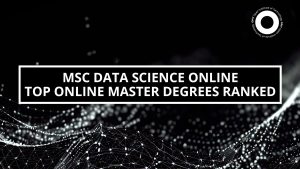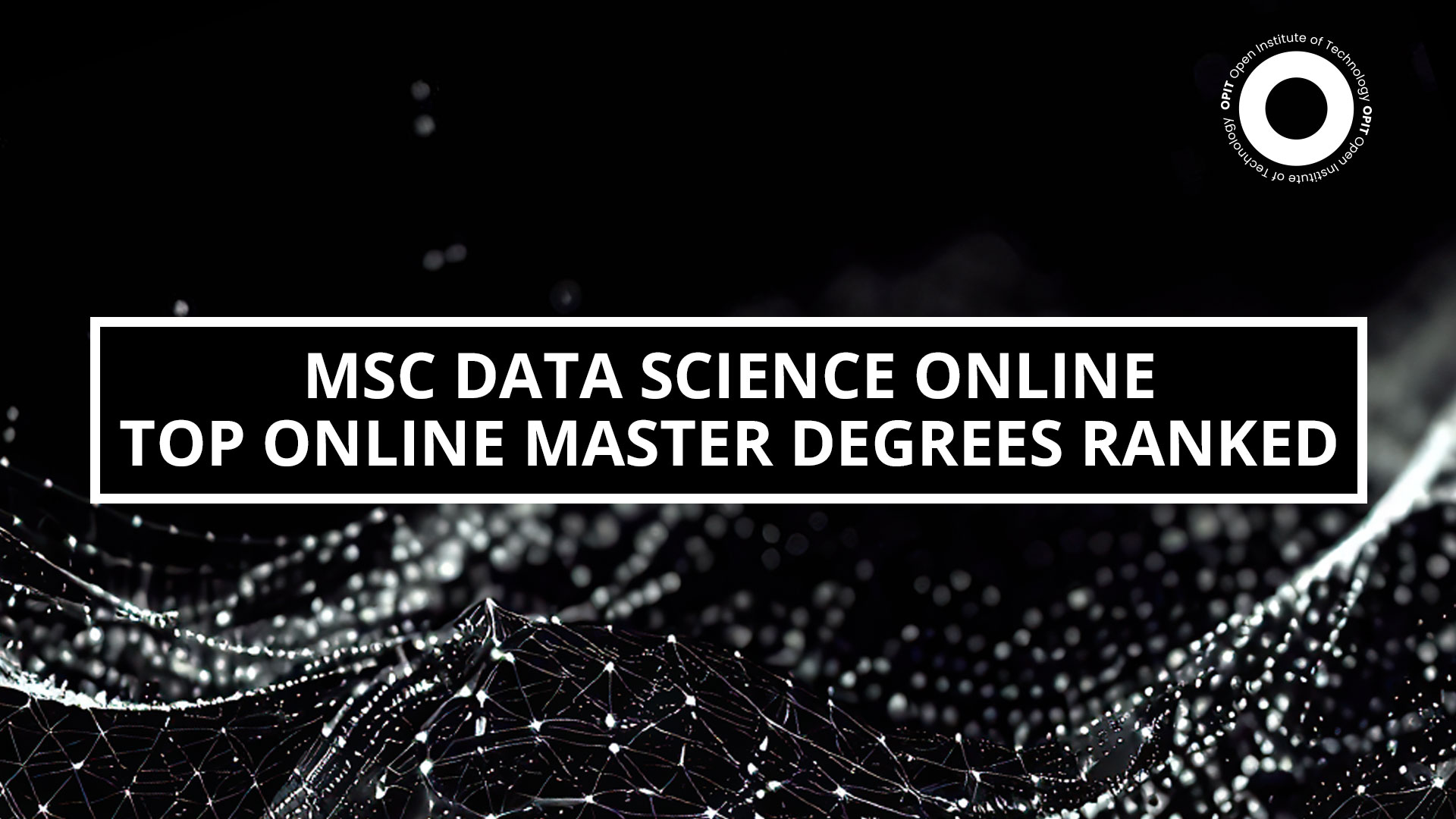You could say that data science is the driving force behind our modern world. Digital technologies are responsible for how we work, play, and socialize, and data science impacts all those areas. This field deals with how computer systems work, learn, and connect through networks. As such, the demand for data science advancements keeps growing.
Unsurprisingly, industries worldwide require more and more data science experts. Many job openings call for people with advanced degrees – a basic knowledge of data science is no longer a considerable advantage in the job market.
Today, getting a master’s degree in data science represents a surefire way to start a lucrative career. These degrees pave the way towards better-paid jobs and higher positions. Best of all, you can get an MSc data science online.
The advantage of an online master’s degree data science program is its convenience and opportunities. You can get a prestigious degree from your home, without having additional complications of moving to campus. Plus, the degree you obtain may come from a leading university, gaining you even more favorable credentials.
Let’s look at the best online data science master’s programs and what they have to offer.
Criteria for Ranking
Finding a quality program for MSc data science online requires a detailed examination according to several criteria. When creating our list, we considered the following in particular:
- University reputation and accreditation
- The content of the courses and program curriculum
- Online program accessibility and flexibility
- Available resources and student support
- Pricing and financial aid options
- Career prospects for graduates
Top Online Master Degrees in Data Science
1. Rome Business School – International Online Master in Data Science
Program Overview
The program consists of three modules. The first focuses on managerial and leadership skills based on data. The second module deals mostly with IT and data science solutions as they apply to business problem-solving.
The third module explores how your competency in data science technology reflects on data governance. The skills you’ll learn here apply to data management through specific methods and processes.
Key Features and Highlights
The International Online Master in Data Science provides the opportunity to participate in bootcamps worldwide. The locations include the U.S., Spain, Italy, and Nigeria.
Students also have the opportunity to work on real-life cases and datasets. This kind of hands-on experience will prepare you for the professional application of your data science knowledge.
Admission Requirements and Process
The admission process for this program will consist of four steps: credential evaluation, confirmation of your application, the interview, and, finally, admission.
Since the program offers introductory classes, previous knowledge of data science isn’t a strict requirement. However, experience in particular topics will count as an advantage in your evaluation.
Cost and Financial Aid Options
Participating in this program costs €6,700. The Rome Business School offers several payment options. First, students can pay in six installments after enrolling. The installments are interest-free.
Next, paying the installments before starting the course makes you eligible for a 5% discount. Finally, paying the entire sum before enrollment comes with a 10% discount.
Scholarships are also available for this program and will be determined according to the applicant’s motivation, experience, and personal profile. Eligible applicants may choose from seven scholarship types.
Career Prospects for Graduates
The program allows students to connect with industry-leading companies, learning from the best while creating meaningful connections. The Rome Business School offers a career service with soft skills, individual coaching, and other training.
2. European Leadership University – Professional Master in Data Science & Leadership
Program Overview
As a data science program with a particular focus on leadership, this program focuses on combining the two disciplines. In other words, learners become more competent as leaders through data science skills.
The program lasts for 19 months, including data skills like machine learning, Python programming, and NLP. On the leadership side, the courses teach coaching, communication, accountability, and similar skills.
Key Features and Highlights
The faculty team at the European Leadership University consists of respected academics and experts who actively practice data science. Besides the proven industry experts and their knowledge and guidance, this program has a notable distinction: it offers two certificates and a data science MSc degree.
The first certificate you’ll receive is in data science after nine months of study. The next is the certificate in leadership and action research, which will become available after month 14. Lastly, doing the final project will award you the MSc degree.
Admission Requirements and Process
The prerequisites for this program include a Computer Science or related undergraduate degree, statistics and programming knowledge, and proven experience in IT.
Candidates who meet these requirements will go through a four-stage application process. You’ll need to submit your application online, pass an analytical test, submit your diploma, and, finally, complete the entry test.
Cost and Financial Aid Options
The program costs €5,000. There are three payment options: installments, early bird, and a flexible plan. Installments are a straightforward option and may be paid during the study period. The early bird bonus refers to paying upfront, which makes you eligible for a 10% discount.
The flexible plan is particularly interesting. It includes a membership fee, paid monthly over a longer period. In addition to the tuition cost, there’s also a €250 registration fee that you don’t have to pay until you’ve been accepted.
Career Prospects for Graduates
The university and its programs have international accreditation, which means the degree you get here will be recognized worldwide. The institution also offers mentoring services and a talent accelerator program, intended to prepare learners for high-profile jobs.
Check out OPIT degrees
-
Career aligned
-
Fully Online
-
EU-accredited institution
3. European School of Data Science & Technology – MSc Data Science
Program Overview
The MSc Data Science program from the European School of Data Science & Technology is a comprehensive course focused on gaining a detailed knowledge of various data science aspects. Particular attention is devoted to programming, statistics, and machine learning.
The program has 12 courses across four semesters, with each course lasting for three weeks. The semesters are organized around particular subjects concerning data science: foundation, analytics and tools, visualization and application, and experiential learning, which contains the master thesis.
Key Features and Highlights
The curriculum for this program was created according to the latest requirements and trends in the industry. Expert teachers offer one-on-one mentoring throughout each course. The program is structured to provide relevant knowledge that you can apply immediately.
Admission Requirements and Process
To enlist in the European School of Data Science & Technology (ESDST) MSc Data Science online program, you’ll need a Bachelor’s degree. However, the degree doesn’t have to be in data science or a related discipline. Lacking a degree, you can also apply for the program if you have more than three years of relevant work experience.
Since the course is in English, you’ll need proof of proficiency with sufficient scores on IELTS, PTE, TOEFL, or another accepted test. Upon the review of your application, you’ll have an interview after which you’ll be notified of whether you’re accepted or not.
Cost and Financial Aid Options
This MSc program costs €490 per month plus the registration fee of €1,500. You can pay the program fee in monthly installments or cover the entire cost (program and registration fee) at once for a 5% discount. Additional options are to pay the entire program fee for a €1,000 reduction, or pay €4,000 initially and cover the rest in 12 monthly installments of €1,500.
It’s worth mentioning that the ESDST offers several scholarships to students who meet specific standards. The scholarships may cover from 25% to 50% of the program fee.
Career Prospects for Graduates
Besides the theoretical knowledge, this program offers plenty of practice in data science, exposing students to all facets of this discipline. The experience from the projects you do during the courses will represent an advantage in the job market. In addition, you’ll be paired with a mentor from a specific industry who can provide further career assistance.
4. University of Glasgow – Data Analytics MSc
Program Overview
The Data Analytics MSc from the University of Glasgow is a three-year program. It consists of 11 core courses and two electives. The first two years follow a pace of two courses per trimester, while the final year consists of the final project and an MSc dissertation.
The program is part-time and covers all crucial facets of data science, including analytics, machine learning, programming, and predictive modeling.
Key Features and Highlights
Renowned international experts and academics teach the courses. The part-time structure allows learners to maintain a job while studying with full freedom in setting their pace. This data analytics MSc also has a fast-track option, letting you obtain the degree in two instead of three years.
Admission Requirements and Process
To enter this program, you’ll need a Bachelor’s degree equivalent to the UK upper second class, which means a GPA of 4.0-4.5. The degree doesn’t need to be from data science or statistics, but it should include mathematics on a higher level.
Alternatively, you may substitute the degree with relevant experience in data analytics or a related field. The application for the program is done entirely online.
Cost and Financial Aid Options
The total cost of the program is £15,000 or about €17,200. Additional fees may apply during the program, but only in specific cases like applying for a dissertation reassessment. Students can apply for a UK scholarship or a country-specific loan if you’re from the UK.
Career Prospects for Graduates
This MSc program creates opportunities in particular data science fields like finance, medical research, statistics, and pharmaceutics. University of Glasgow graduates reportedly boast an enviable track record in terms of employment.
5. University of Europe for Applied Sciences – Data Science MSc
Program Overview
Built with flexibility in mind, this online master degree data science program offers two, three, or four-semester options. These award 60, 90, and 120 ECTS points, respectively. All variants include courses on data analytics, engineering, and science, while the three and four-semester programs also have data visualization and marketing analytics.
Key Features and Highlights
In addition to detailed knowledge of data science, the program teaches other crucial skills, particularly in the first semester. During that time, you’ll obtain advanced English skills, learn the foundations of programming and the Office suite, and get familiar with scientific writing.
Admission Requirements and Process
You’ll need to have completed a Bachelor’s program (not necessarily in data science) to apply to this MSc. A basic grasp of programming will also be required, although a preparatory course is available if you lack any programming experience.
The admission process will consist of an entry exam and an online interview.
Cost and Financial Aid Options
Tuition fees for EU students are expressed in monthly values: €820 per month for any curriculum. Non-EU students will pay a €10,938 yearly fee. A 15% or larger discount is applicable for early applicants. Additionally, scholarship may be available on a case-by-case basis.
Career Prospects for Graduates
The University of Europe for Applied Sciences collaborates with European, multinational, and global partners. This collaboration opens up career paths for students, including actual projects and internships with leading companies like Daimler and BASF.
Check out OPIT degrees
-
Career aligned
-
Fully Online
-
EU-accredited institution
Tips for Choosing the Right Online MSc Data Science Program
Choosing an MSc data science online program will require careful consideration. Here’s what you should take into account to ensure you’ve enrolled in the right program:
- Whether the program aligns with your career goals
- Flexibility and time requirement
- Faculty quality and the curriculum
- The reputation and accreditation of the university
- Fees and available financial aid
Enroll in the Best Online Data Science Master’s Program
Once you gain an MSc in data science, your job opportunities will increase. The demand for new experts in the market is always high, with those holding relevant degrees having the upper edge. If you’re certain that a career in data science is right for you, don’t hesitate to complete an MSc in one of the leading institutions in the field.






